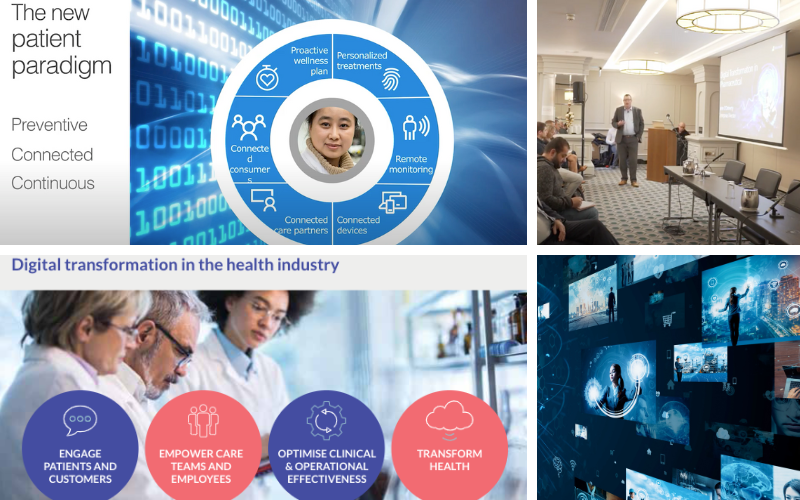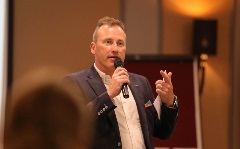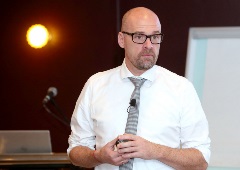John O’Doherty - The Digital Transformation in the Pharmaceutical Industry
We are transitioning from the old patient paradigm which was reactive, disconnected and cyclical to the new patient paradigm, which is preventive, connected and continuous as individuals now want to have more control.
INTRODUCTION
Some of the most exciting breakthroughs at the intersection of science and technology are in precision healthcare. We all stand to gain from a health system that can precisely care for us based on our unique biology, environments and ailments. Cloud and advanced artificial intelligence are the key tools that will help achieve that future. One trend seen is that the industry has to get more personal for individuals. Everyone wants personal healthcare; it has to be effective and tailored to you. AI and Cloud Computing have the power to make things personal. They are the start of the process and with more data available, it will make the process more effective.
We must fundamentally change the culture of our organisation to be more open, more agile and to move much quicker in the industry. We must expect to be disrupted. If the market is not disrupting us, we need to disrupt ourselves internally.
Satya Nadella believes that every business will be a software business. The Internet of Things promises to affect all businesses by making their software businesses. Businesses need to look at how they can be transformed through data. Building applications for customers, using analytics to get data and then using that to drive business, these activities will fundamentally change the economies of businesses using the “system of intelligence”. This is a new era which combines systems of record; use from a data perspective and systems of engagement; focused on the digitalising customer and partner interaction. This new era of computing will improve an organisation’s intelligence. This is because individuals want personal data, they want access to their medical records, but they want it in real-time.

We are transitioning from the old patient paradigm which was reactive, disconnected and cyclical to the new patient paradigm, which is preventive, connected and continuous as individuals now want to have more control. They have more knowledge and understand more of what’s going on from a health perspective. We are seeing there is a shift within the industry. As people are getting more interested in monitoring their health, they start
to value that telemetry. This is seen right across the marketplace around wearables but also from a sensor perspective. Then you start to see a conversion of the Internet of Things on sensors. Relating wearables, sensors and the Internet of Things is sending different, personal telemetry back to the cloud and are being used for analytics that gives you observations on your health in an ongoing and immediate way. People are becoming more comfortable with their data being stored in the cloud once that telemetry can be beneficially used for them.
There are also trends in analytics, machine learning and AI to be used to accelerate medical experiences. The message here is clear. We are seeing many tailored services to the individual, based on data records and utilizing cloud-based technologies, AI and machine learning to be faster and more efficient and more efficient as well as delivered in a way that is consumable and personalised.
What does this look like in the future? We are dealing with much more educated consumers therefore prescription drugs themselves won’t be the full answer as we go forward. In the next five to seven years, what we are seeing is that it will be part of a full value chain. You will see prescription drugs with the health plan adopted by the patient. There could be a very strong new monetization model for your industry, where you can relate outcome-based success with prescribed drugs. There are huge possibilities and opportunities here in the market. You need to empower your team around how they bring the knowledge that they have and the technology available to create different successful innovations. And of course, you need to optimise your production and your operational effectiveness.
This is all about possibilities. There is a human element which is the knowledge that you have. Technology is not going to replace that knowledge. It is a platform to allow us to move forward and be innovative, and that is the synergy that we see as an organisation. We don’t know exactly what this looks like yet, but this is where we build systems of intelligence which will monetise right across the industry.

John O'Doherty
Enterprise commercial leader at Microsoft
Director of Enterprise Commercial sales organisation for Microsoft Ireland, focusing on helping customers digitally transform their businesses.
Read more...Our Impact

IMPACT
Digiskills Africa Workshop
Equipping graduates with skills and knowledge in digital transformation applicable to the high-tech manufacturing industries in an African context

INSIGHT
Digital Maturity & Sustainability Assessment
We can help you determine where you are on the road to Industry 5.0, where you are benchmarked against other manufacturing organisations ...
INSIGHT
How big data can book manufacturing efficiency
Over the last decade, manufacturers have been able to reduce waste in and enhance product yield from their manufacturing process...






